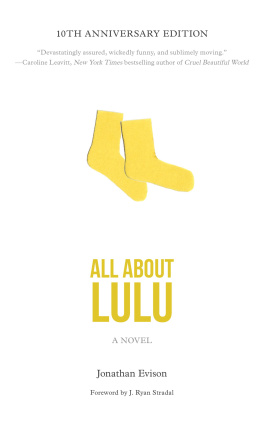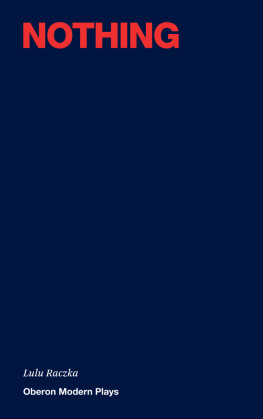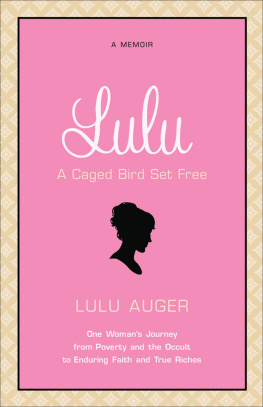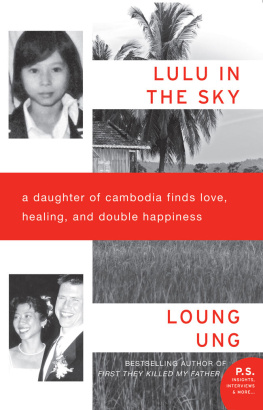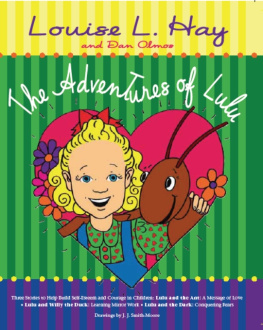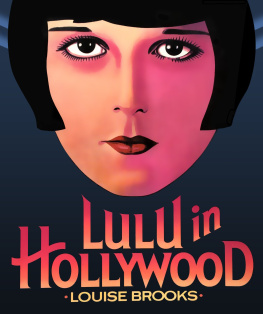

Also by Jonathan Evison
West of Here
The Revised Fundamentals of Caregiving
This is Your Life, Harriet Chance!
Lawn Boy (coming April 2018)

For Lauren
Copyright 2008, 2018 by Jonathan Evison
Foreword copyright 2017 by J. Ryan Stradal
All rights reserved under International and Pan-American Copyright Conventions.
This is a work of fiction. Names, characters, places, and incidents are the product of the authors imagination or are used fictitiously. Any resemblance to actual persons, living or dead, is entirely coincidental.
The Library of Congress has cataloged the original paperback as follows
Evison, Jonathan.
All about Lulu : a novel / Jonathan Evison.
p. cm.
ISBN-13: 978-1-59376-196-7
ISBN-10: 1-59376-196-1
1. Teenage boysFiction. 2. StepfamiliesFiction. 3. Los Angeles (Calif.)Fiction.
I. Title.
PS3605.V57A795 2008
813.6dc22
2007046761
Paperback ISBN: 978-1-59376-208-7
Cover design by Sarah Xanthakis
Book design by Neuwirth & Associates, Inc.
Soft Skull Press
1140 Broadway, Suite 704
New York, NY 10001
www.softskull.com
Distributed by Publishers Group West
Printed in the United States of America
10 9 8 7 6 5 4 3 2 1
Foreword
by J. Ryan Stradal
Ive admired Jonathan Evison for a long time, and for a long time Ive wondered, How the hell does he do it?
Im not talking about his prolific output, the natty suits, his ability to write great novels while being a family man, music nut, and peerless Seahawks fanatic, or even his performance styleamong authors, hes one of the top ten readers Ive ever seenbut Im talking about something even more difficult to replicate.
During the comparatively brief time Ive been nurturing my own writing career, Ive often been asked by aspiring writers if theres some skill, habit, or trick they can unlock to further develop their own craft. To answer that empathy is involved may be a clich, but I keep coming back to it, because theres no better answer. Once I realized that Jonathans career is a master class on the utility of empathy in fiction, the success hes earned from his enviable range of books makes perfect sense.
As fiction writers, our stock in trade is imagining the minds and emotions of our characters so effectively that the reader feels that they know this person, becomes invested in them, and feels emotions along with them. Whether such characters are likable in any sense is besides the point; regardless of the characters mien or conduct, they must be human enough to hold a readers attention, and on this standard, Jonathan always succeeds. Within the book youre holding in your hands, All About Lulu , Jonathan trains his heart on a wild, motley cast, including the intense, mysterious Lulu, an unlikely pair of Venice Beach hot dog entrepreneurs, a child bodybuilder turned teen goth, and, most prominently, the hopelessly lovelorn Will.
I know from experience the challenge of writing from the point of view of a much younger personparticularly with my own teenage memories dissolving into irrelevant nostalgiawhich makes Jonathans success at characterizing Will, the kaleidoscopically heartbroken narrator of this story, all the more wonderful. Like many of Evisons characters, hes not merely a faultless victim or an outsider. His flaws and poor decisions brutally complicate his life as he evolves into a young man devoted to, and increasingly enslaved by, a consuming and futile obsession. Theres certainly a literary legacy of similar boys in fiction, and indeed All About Lulu s opening paragraph itself is an impish play on a classic of the genre. In no time, however, both Will and the novel blaze a unique and moving new path, dominated early by Wills father, who I wouldve thought of as an invention of magical realism had I never left my native Minnesota, but who I find wildly believable as an eighteen-year resident of Southern California. Most of Jonathans characters youll never completely agree with, and some you may cross the street to avoid, but its clearand I adore it when I can perceive this as a readerthat he loves all of them. With this generous stake at the root of his narratives, Jonathan achieves that rare, wonderful hybridbooks that are both a soulful reflection of contemporary society and an entertaining respite from it.
From where I write this in mid-2017, our daily lives as Americans besieged by the thundering rumpus of the flagrantly narcissistic and self-interested, and I awake each day wondering what fresh hell awaits the vast majority of us not among the privileged, Jonathans work has never felt so timely. Though All About Lulu isnt explicitly political, if mere empathy is now cornered into being a political act, the book is a motherfucking Molotov cocktail. It does more than launch a remarkable career; it opens us to the soul a writer of enviable heart who, helpfully, will also make us laugh. Among the dour dystopias and trifling distractions intended merely to further a didactic argument or permit our disengagement, his stories of how working-class people simply got by, amused themselves, tried to love one another, and survived the early twenty-first century truly resonates. Were that a thousand more Jonathan Evisons existed today, historians could look back on this era in a hundred years and say, maybe they were okay after all.
For now, as readers, we must be content to revel in the Jonathan Evisons that exist among us. We must support them where we see them, and learn from them what we dont know already about what it costs and takes to be human. Ive come to view his books as messages in bottles from an equally flawed but more hopeful world, telling us, like much great fiction does, that were not alone out here, and if these outsiders can pull their lives together into some semblance of understanding, peace, and even happiness, perhaps we also have a shot.
Finally, should you be lucky enough to meet Jonathan and see him read, and revel in the appreciation and kindness he has for both his characters and readers, please be kind in return. Dont bring up the Seattle Seahawks unless theyve recently won.
June 2017
Introduction
Jell-o Shots,
Hot Dog Cakes, and
Enduring Gratitude
When All About Lulu was originally published by Soft Skull in the spring of 2008, I was a thirty-nine-year-old marginally employed landscaper with a checkered and fabulously unfocused employment history, which included (but was not limited to) caregiver, landscaper, gas-meter checker, bartender, rotten-tomato sorter, auto detailer, purveyor of sausages, and telemarketer of sunglasses. I had seven previous novels under my belt before Lulu , all of which were conspicuously unpublished. Some of them were actually pretty good. Most of them were not.
My wife, Lauren, was pregnant with our first child at the time of Lulus release. We were broke as hell and eating a lot of Swansons pot pies and spaghetti, as we worried about providing for our future. I wasnt exactly on any kind of career track. My mom, God love herlong-suffering provider, single mother of fivewas bestowing fifty-dollar Safeway gift cards on us twice a month. I wasnt a terrible person, but my prospects were not bright.
Soft Skull was run out of a single room in Brooklyn in those days, and Richard Nash, the editor who saw what twenty-odd other editors in New York did not see in All About Lulu , wore a lot of hats. Richard was Soft Skull. He was a mad, irrepressible genius with a theater background. A pure, indefatigable spirit with a Gaelic charisma and lilt of speech that left you spellbound, and always made you believe in whatever it was he was talking about. And Richard Nash was almost as broke as me. He was also every bit as passionate and dogged and bat-shit crazy. He believed fiercely in the books he championed. He never stopped pushing to get them recognized: to booksellers, reviewers, mavens, as well as to random people in line at bodegas and subway stations. What Richard lacked in resources he made for up in passion, presence, savvy, and elbow grease. Having grown up in punk bands in early 80s Seattle, I totally connected with Richards DIY approach to publishing; it allowed me to be myself, which was pretty much the goal.
Next page
